|
|
|
Sort Order |
|
|
|
Items / Page
|
|
|
|
|
|
|
| Srl | Item |
| 1 |
ID:
140085
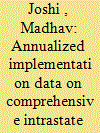

|
|
|
|
|
| Summary/Abstract |
This article introduces the Peace Accords Matrix Implementation Dataset (PAM_ID). We present time-series data on the implementation of 51 provisions in 34 comprehensive peace agreements negotiated in civil wars since 1989. We follow the implementation process for up to ten years following the signing of each agreement. The data provide new insights into the types of provisions that are more or less likely to be implemented, how implementation processes unfold over time, how implementation processes relate to one another, and how implementation affects various post-accord outcomes. We outline our coding methodology and case selection, and examine descriptive statistics. We illustrate one potential use of the data by combining eight different provisions into a composite indicator of security sector reform (SSR). A survival analysis finds that implementing security sector reforms contributes to long-term conflict reduction not only between the parties to the accord but also between the government and other non-signatory groups in the same conflict.
|
|
|
|
|
|
|
|
|
|
|
|
|
|
|
|
| 2 |
ID:
160733
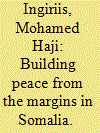

|
|
|
|
|
| Summary/Abstract |
The prevailing discourse in Mogadishu among the federal government of Somalia and the international community is that Al-Shabaab is no longer relevant in contemporary Somali political landscape. In the language of the government, Al-Shabaab is like a lost crocodile thrown out from the river. In the lexicon of the international community, Al-Shabaab is gradually receding. In fact, Al-Shabaab is actually puissant and potent in terms of social, political and military capabilities; not just in Somalia, but also in the wider East Africa region. Why is Al-Shabaab resilient and resistant? Why is it even more effective than the federal government? To answer these questions, this article reveals how Al-Shabaab is increasingly more legitimate than the federal government. In conclusion, the article proposes that negotiated settlement with the insurgency movement could lead to peace in war-torn southern Somalia.
|
|
|
|
|
|
|
|
|
|
|
|
|
|
|
|
| 3 |
ID:
148959


|
|
|
|
|
| Summary/Abstract |
For the last 15 years, the war in Afghanistan has caused hundreds of thousands of deaths and the United States has sent thousands of troops and spent billions of dollars supporting strategies that have been unable to curtail the violence in the country. In addition to deploying over 130,000 troops from 51 North Atlantic Treaty Organization (NATO) countries and its partner nations, the United States alone spent over $686 billion in the ‘Afghan war’.
|
|
|
|
|
|
|
|
|
|
|
|
|
|
|
|
| 4 |
ID:
190434
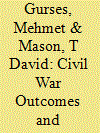

|
|
|
|
|
| Summary/Abstract |
While a growing body of research has highlighted a significant and positive relationship between negotiated peace agreements and postwar democratization, they have focused almost exclusively on a minimalist form of electoral democracy. We extend this analysis to consideration of how civil war outcomes affect egalitarian democracy, which measures the extent to which the regime incorporates (1) equal protection of rights and freedoms, (2) equal distribution of resources, and (3) equal access to power. We add V-Dem egalitarian democracy measures to the UCDP Conflict Termination dataset to determine whether civil war outcomes account for just the emergence of electoral democracy or whether they also affect the prospects for a more just and equitable society for citizens at the grassroots level. Our findings highlight the need to qualify the effect of modes of war termination on postwar democratization. Peace agreements are followed by higher levels of democratization than is the case with other civil war outcomes, but the effect on egalitarian democracy is more durable than the effect on electoral democracy.
|
|
|
|
|
|
|
|
|
|
|
|
|
|
|
|
| 5 |
ID:
167377
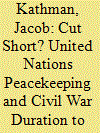

|
|
|
|
|
| Summary/Abstract |
While much literature on peacekeeping seeks to determine the effect of United Nations (UN) intervention on post-conflict peace processes, most peacekeeping operations (PKOs) are deployed to active conflicts. The limited research on peacekeeping in active civil conflicts suggests that robust PKOs reduce hostilities. Yet, if PKOs serve to extend conflict duration, even lowered hostilities can yield greater destruction over time. We thus explore the effect of peacekeeping on conflict duration. We argue that PKOs with larger troop deployments are better able to increase the cost of combat, improve information sharing between belligerents, and provide security guarantees, thus reducing the time to negotiated resolutions. Using fine-grained data on monthly peacekeeping personnel commitments and observations of ongoing conflict between combatants, we examine how variations in mission deployments affect the success of UN peacekeeping in ending civil conflicts. As expected, our findings indicate that larger troop deployments shorten war duration to negotiated resolution.
|
|
|
|
|
|
|
|
|
|
|
|
|
|
|
|
| 6 |
ID:
079923
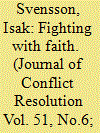

|
|
|
|
|
| Publication |
2007.
|
| Summary/Abstract |
A growing literature has started to explore the relationship between religious dimensions and the escalation, duration, and termination of armed conflicts. This study explores the conditions for negotiated settlements. The author argues that if the belligerents' demands are explicitly anchored in a religious tradition, they will come to perceive the conflicting issues as indivisible, and the conflict will be less likely to be settled through negotiations. Utilizing unique data on the primary parties' religious demands and identities, all intrastate conflict-dyads in the Uppsala Conflict Data Program (UCDP), 1989-2003, are examined. The study finds that if governments or rebel-groups have made explicit religious claims, these conflict-dyads are significantly less likely than others to be terminated through negotiated settlement. By contrast, whether the primary parties come from different religious traditions does not affect the chances for negotiated settlement
|
|
|
|
|
|
|
|
|
|
|
|
|
|
|
|
| 7 |
ID:
075105
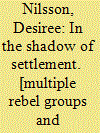

|
|
|
|
|
| Publication |
Uppsala, Department of Peace and Conflict Rsearch, 2006.
|
| Description |
viii, 145p.
|
| Series |
Report no. 73
|
| Standard Number |
9150618881
|
|
|
|
|
|
|
|
|
|
|
|
Copies: C:1/I:0,R:0,Q:0
Circulation
| Accession# | Call# | Current Location | Status | Policy | Location |
| 051952 | 355.0218/NIL 051952 | Main | On Shelf | General | |
|
|
|
|
| 8 |
ID:
189939
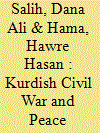

|
|
|
|
|
| Summary/Abstract |
The Kurdish Civil War between the military forces of the Kurdistan Democratic Party (KDP) and the Patriotic Union of Kurdistan (PUK) began in 1994. Despite frequently occurring peace talks throughout the conflict, negotiations failed to bring about a durable settlement until the United States brokered the Washington Peace Agreement in 1998. This research explores why the earlier negotiations were unsuccessful, and whether it was only the US mediation in 1998 which made the difference. Although the US mediation was clearly an important factor, by employing the contingency model this research argues that both contextual variables and process variables determined the success of negotiations in 1998. Furthermore, they can explain the failure of the previous 4 years of negotiations.
|
|
|
|
|
|
|
|
|
|
|
|
|
|
|
|
| 9 |
ID:
151259
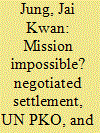

|
|
|
|
|
| Summary/Abstract |
Under what conditions can democracy emerge and survive in countries emerging from violent civil conflicts? Using event history analysis, this article shows that the chance for democratization increases substantially by the combination of two factors: whether a civil war ends through peace negotiations and whether United Nations (UN) peacekeeping forces are deployed after the signing of a peace treaty. Negotiated settlements or UN peacekeeping operations alone cannot resolve the security dilemma and credible commitment problems of civil war adversaries, which are the main obstacles to the transition from war to peace and democracy. Yet these factors have little to do with sustaining democracy in the aftermath of civil war. What matters most for the survival of democracy is rapid economic recovery that can provide better opportunities for former combatants to be reintegrated into normal economic life. These findings suggest that for successful post-conflict democratization the international community should mediate peace negotiations actively and also make a strong effort to maintain peace while helping to reconstruct the war-torn economy.
|
|
|
|
|
|
|
|
|
|
|
|
|
|
|
|
| 10 |
ID:
180196
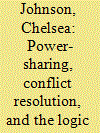

|
|
|
|
|
| Summary/Abstract |
Conclusions about the potential for peace via power-sharing are mixed. For some, power-sharing does little to overcome the commitment problem characterizing a transition from conflict, while others argue that such concessions provide signals of parties’ willingness to incur costs. This article develops and tests a new theory, aiming to shed light on the mechanisms through which power-sharing bargains help to overcome the commitment problem. I argue that government parties tend to hold an electoral and military advantage, which heightens incentives for rebel leaders to defect from a settlement prior to conceding their capacity to use violence. Where settlements provide discrete guarantees that offset the risks of electoral defeat and the co-optation of forces, these incentives for pre-emptive defection should be mitigated. I offer a novel disaggregation of provisional power-sharing subtypes, distinguishing between long-term and short-term arrangements. The analysis rests on an original, cross-national dataset of government-and-rebel dyads to negotiated settlements signed between 1975 and 2015 (N = 168). The logistic regression results clearly indicate that power-sharing settlements stipulating ‘consociational’-style reforms are significantly more likely to resolve conflict between settlement dyads, all else equal. Meanwhile, standard conceptualizations of power-sharing, which include transitional coalitions and troop integration, appear unlikely to secure rebel commitment beyond the transition period, which helps to explain the contradictory findings in existing research.
|
|
|
|
|
|
|
|
|
|
|
|
|
|
|
|
| 11 |
ID:
116705
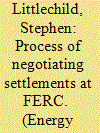

|
|
|
|
|
| Publication |
2012.
|
| Summary/Abstract |
Interstate gas pipelines and their customers presently settle about 90% of the rate cases set for hearing before the Federal Energy Regulatory Commission (FERC). The conventional regulatory litigation process is now only an occasional means of dispute resolution. This paper explains the settlement process, illustrating with the 12 section 4 rate cases brought by pipelines from 2008 and 2009. The paper also discusses and illustrates why parties prefer settlement to litigation, what difference it makes, which cases tend to settle, what might account for the increasing frequency of settlements over time, the recent phenomenon of pre-filing settlements and the recent settlement of section 5 cases brought by FERC. In contrast to many other regulatory jurisdictions, FERC Trial Staff play an active role in facilitating negotiation and settlement. They make an initial analysis 3 months after a pipeline files for a tariff rate increase. Thereafter, the regulatory aim is to bring the parties into agreement, not to determine an outcome and impose it upon them. This is a different role for the regulatory body than was previously apparent.
|
|
|
|
|
|
|
|
|
|
|
|
|
|
|
|
| 12 |
ID:
140413
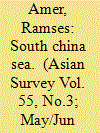

|
|
|
|
|
| Summary/Abstract |
The study analyzes disputes and dispute management in the South China Sea. The progress made is outlined through an overview and analysis of formally settled disputes. The unsettled disputes are identified, analyzed, and assessed. The study concludes with a broader assessment from the perspective of dispute management.
|
|
|
|
|
|
|
|
|
|
|
|
|
|
|
|
| 13 |
ID:
138597
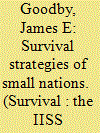

|
|
|
|
|
| Summary/Abstract |
Not all small nations take quite such an extreme a view of their place in the world, but most of them have had historical experiences that justify this kind of existential fear. After all, the vulnerabilities of small nations have been demonstrated countless times throughout history. Thucydides famously recorded the fate of the island of Melos in his history of the Peloponnesian War between Athens and Sparta in the fifth century BCE. A passage in this history, usually called the ‘Melian Dialogue’, describes how the leaders of Athens decided that Melos, which was aligned with Sparta, should be absorbed into their empire. Accordingly, they demanded that
Melos capitulate, under threat of all-out war.
|
|
|
|
|
|
|
|
|
|
|
|
|
|
|
|
|
|
|
|
|